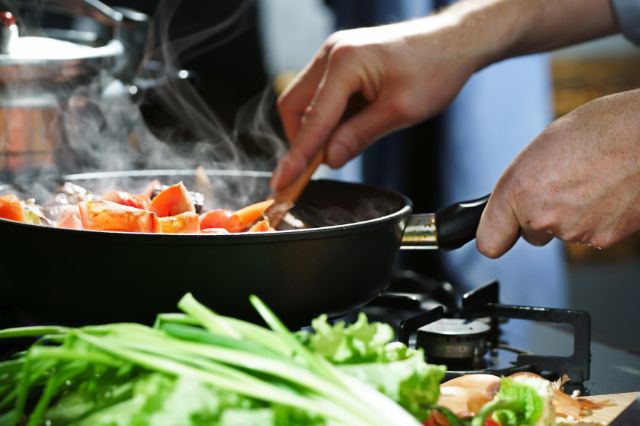How to be more Eco-friendly when Cooking

If you’re looking for ways to reduce your personal impact on the planet, then a few tweaks to your personal habits might be in order. Taking shorter showers, or colder ones might be effective. The same might be said of insulating the loft, turning down the thermostat, or swapping out the light bulbs for energy-efficient LED ones.
But the way we manufacture and prepare food is actually pretty energy intensive. As such, it deserves special consideration. Let’s take a look.
Keep compost
If you have a compost bin in your kitchen, you’ll be able to put any scraps of compostable matter to use in your garden. That might mean onion skins, eggshells, and a range of other bits and pieces that you might otherwise send to a landfill. Do your research to make sure you’re putting your compost in the right place and using the correct waste.
Reduce your food waste
By shopping more frequently, you’ll reduce the chance of things going out of date. You might make bigger trips for non-perishable goods, like oils, tins and dried food, and then smaller trips for short-dated stuff like fruit.
This can also be done by making a meal plan, taking a shopping list when you go grocery shopping and using leftovers or food scraps creatively. Why not make some crispy potato skin chips or turn that leftover soup into a delicious pasta sauce?
Upgrade the hob
Ceramic and gas-based hobs will generate heat, a portion of which is transferred into your pan. An induction hob, coupled with induction pan sets, on the other hand, will induce heat directly inside the cookware itself, which means less waste.
Cut down on water
Wasting water in the kitchen can be an incredibly easy thing to do, but there are plenty of ways we can cut down our water use. Peeling your vegetables instead of washing them and steaming them instead of boiling offers a more eco-friendly way of cooking. Not only that, but it’s also great for holding way more nutrients and retaining their flavour and colour.
But even if you’re frying everything, you must factor in the water that was used to grow the food you’re eating. According to one estimate, that means fourteen thousand litres per kilogram of beef. This leads us to our next point.
Eat less meat
Even if you dispute the precise figures, there’s no getting around the fact that livestock takes up land that might otherwise be used to reclaim carbon through forestation and requires energy to rear. You don’t have to cut meat out entirely to reduce your impact, maybe start with a few plant-based meals a week and see how you can expand from there!
Re-use items
Certain items of packaging can be dispensed with. Plenty of Supermarkets offer eco-friendly departments where you can go to refill your items instead of having to buy new packaging every time. Go for a refill on your coffee jar, rather than buying an entirely new glass one. Look for tea towels instead of paper towels, and metal straws over plastic ones.
Silicone is great for Tupperware and keeping food fresh, and also for reusable cupcake papers when baking.
Go Local
If you’re shopping locally, then you cut down your food miles. After all, the produce you get from a few miles down the road is less carbon-intensive than the stuff you get from South America. It also is a lot fresher and is great for boosting your local economy.





